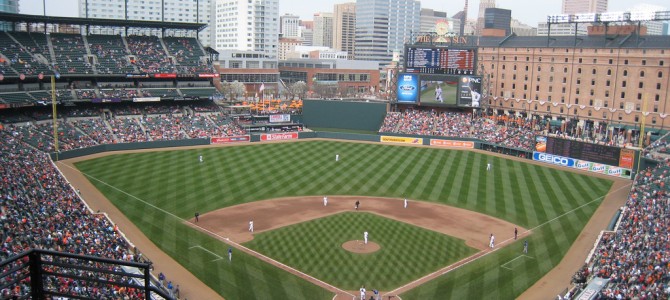“The whole damn system is guilty as hell”, the protesters chanted as they marched on the White House this week. Motivated by the death of Freddie Gray, by what they have seen in Baltimore, and by the frustrations of dealing with a political elite they have repeatedly helped elect – who have promised to help them and then forgotten them once in office – inner city minority voters are increasingly frustrated with a system they no longer believe is interested in actually protecting them.
The riots in Baltimore and the city’s future in the aftermath are sad topics. There is an opportunity for reformers to pose an alternative to the failed great society policies that led to them, and to call for significant changes to the corrupt local governments that fail to serve their community. But even with all the riots and discord, it was the Orioles game in the empty stadium on a sunny afternoon that strikes me as the worst thing that’s happened when it comes to the future of the West this week.
Baltimore is a proud city – blue collar, working class, irascible. I always liked that Chris Rock joke about Iraq – “You took Baghdad in two weeks, you couldn’t take Baltimore in two weeks.” And the Baltimore Orioles fit that city – they are deeply embedded in its consciousness and in the heartbeat of the town. The comparison Mollie Hemingway drew this week – that the team and the stadium is more like a church than a business – is an accurate one.
“We live in a time when Americans feel a certain separation from institutions. Politics is increasingly controlled by crony capitalists who buy and sell policy ideas, regulatory restrictions and subsidies. The media are completely out-of-touch with average American concerns. They spend time partying with celebrities, fawning over certain politicians while derisively mocking others, and covering complex issues with one-sided hysteria instead of dispassionate fact-gathering. Individuals are less likely to be involved in social clubs and life-long marriages than were their parents and grandparents. We’re too separated from each other in too many ways. The idea that baseball doesn’t truly require fans’ presence is somehow ominous, portending a dystopic future where even baseball is severed from average Americans, where teams are solely profit-making entertainment as opposed to communal celebration.”
What happened in Baltimore is the opposite of what should’ve happened. On a sunny afternoon in the aftermath of all this strife, it should’ve been a moment for the coming together of a community, not a forced and awkward separation. The options they should’ve considered weren’t even on the table. You could’ve played that game at Dunbar high school and let the world come, or at Camden Yards, and offered free admissions. Play the game normally, and then have Orioles exit the stadium in uniform and head toward the trouble areas.
Teams matter because hometowns matter. The team belongs to Peter Angelos, but that’s not really the team – it’s the franchise, the business. It’s not even about the players. Individually, the players are this or that – they come and go. There’s a Brooks or a Cal, but for the most part, it’s not the individual players that matter, but the uniform, the institution. It’s not just about “rooting for laundry” – it’s about taking pride in what you have together, young and old, rich and poor, black and white. In reality, the team exists as the embodiment of the collective communal memory, memory that carries moral authority in towns from Boston to Buffalo. As Dan McLaughlin wrote eloquently after 9/11, it’s when we argue about sports that we are reminded about what freedom is. When the thing we really hate is those damn Yankees, it’s a sign that we are safe and secure from the horrors of the world. That’s why teams exist as an enormous part of the solution here – they’re not another business that needs property protection. They’re the bond that heals the wounds even in conflict on the field of play.
When you shut the doors to the stadium and play the game for just the cameras, you’re shutting off something that exists at the center of a hometown, of the place that you live with the people and neighbors you love, the place you would value and defend against all enemies. Sports may seem like it’s less important than the other aspects of life, but when we gather in these places to root for the home team, it reflects the values we have as citizens, and in so doing, speaks to the better angels of our nature – the things that hold us together when the world is falling apart.









